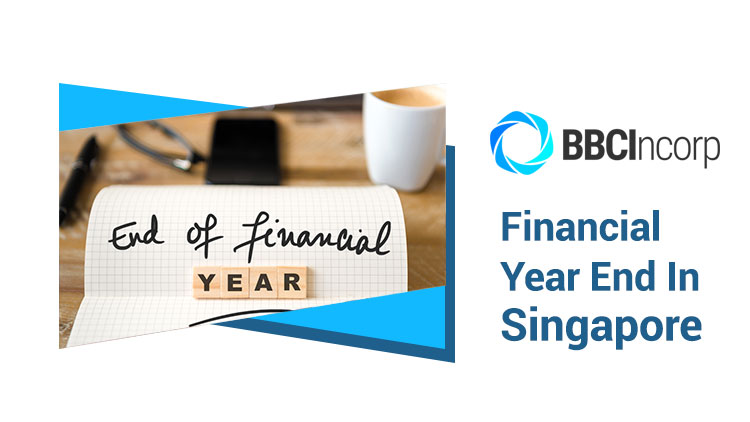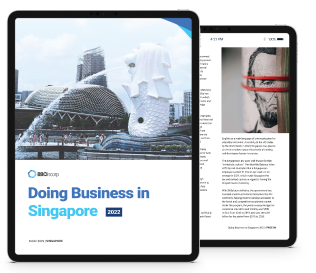
Determining Financial Year End (FYE) in Singapore is pretty important. It is one of the requirements that newly-established companies in Singapore need to comply with. It can also significantly affect the taxation of these businesses.
So, in this blog, let’s find out what it is, what factors to consider when choosing FYE and how you can change it when needed.
1. Overview of Financial Year End in Singapore
A financial year is an accounting term which is used for budget purposes. Particularly, during this period, a company will make expenses and earn income from its activities. So, Financial Year End (FYE) refers to the completion of a company’s accounting period. In other words, FYE is the last day of a financial year.
After the Financial Year End, the chargeable income will be calculated and income tax will be determined accordingly in the year after. This following year is called Year of Assessment or usually written YA for short. For example, if you choose the FYE of your company to be on 31 March each year, then your company’s income earned in a financial year from 1 April 2018 to 31 March 2019 will be taxed in YA 2020.
In Singapore, it totally depends on the company itself to choose the Financial Year End falling on any day in a calendar year, not necessarily on the 31st December. According to Section 198 in the Companies Act, there are some regulations on financial year that you need to bear in mind:
- The company’s first financial year starts on the date of incorporation and ends on the date submitted to the Accounting and Corporate Regulatory Authority (ACRA)
- A subsequent financial year starts right after the end of the previous year
- The first financial year of a company cannot last longer than 18 months without approval from the Registrar.
A new company must notify its FYE to ACRA upon its incorporation.
note
A company incorporated before 31 August 2018 which did not notify ACRA of their FYE date will have its statutory FYE to be the anniversary of its incorporation date.
In contrast, it is a requirement in law that companies incorporated on or after 31 August 2018 must determine their FYE upon incorporation. If companies want to change their FYE or their period of financial year, they have to notify ACRA via the notification of change of FYE.
Free ebook
Get your Singapore business started with key matters covered in our all-in-one guideline
- Incorporation procedure
- Annual compliance requirements
- Tax structures
- Employment landscape

2. Factors to Determine a Financial Year End for a New Business in Singapore
If you are a new business owner who has just established your company in Singapore and still has not determined a FYE yet, then, we suggest taking the following factors into consideration: Tax exemption, business activities, being a subsidiary company, and other compliance requirements.
2.1. Tax Exemption for Start-ups
The first thing you need to know is the fact that there is a Start-Up Tax Exemption Scheme in Singapore which offers new businesses from YA 2020 onwards the followings:
- An exemption rate at 75% of the first $100,000 of normal chargeable income; and
- An additional exemption rate at 50% of the next $100,000 of normal chargeable income.
The above tax exemption will last for the first 3 consecutive Years of Assessment. Therefore, you need to somehow adjust your financial year to maximize the coverage of the tax exemption for your new start-up company by choosing the most suitable FYE.
You are recommended to choose the first Financial Year End to fall on the last day of the 11th month from the date of incorporation to maximize the tax incentives under the scheme.
2.2. Business Activities
Another factor to consider is your business cycle. It is the period in which a company experiences rises and falls in production, trade, and general economic activity due to seasonal business’s nature,
It is recommended that you choose the FYE falling on the end of the business cycle when there are fewer transactions and inventory is at its lowest. At this time, you will have more time to manage your bookkeeping.
2.3. Subsidiary
This factor only needs to be taken into consideration when your company is a subsidiary of another company. To avoid hassle and mismatch accounting between the two entities, you are suggested to determine the Financial Year End for your subsidiary company in Singapore corresponding to that of the holding company, in order to ease the filing of consolidated financial statements.
2.4. Other Factors
Last but not least, some compliance requirements also need to be considered since these things have to be done right after the FYE:
- Estimated Chargeable Income (ECI): Your company is required to file ECI within 3 months when a financial year ends, other than companies who are eligible for ECI waiver or qualify for the administrative concession.
- Annual General Meeting (AGM): Listed companies are required to hold AGM within 4 months after FYE and within 6 months after FYE for any other companies.
- Annual Return (AR): After AGM, companies then are required to file AR, to be specific:
- Companies having a share capital and keeping a branch register outside Singapore must file AR within 6 months (if listed) or 8 months (if not listed) after FYE
- Other companies must file AR within 5 months (if listed) or 7 months (if not listed) after FYE
3. How to Change Financial Year End in Singapore
There are some regulations that companies with FYE ending on or after 31 August 2018 must follow:
- Companies must notify the Registrar if there is any change of FYE;
- Companies cannot change its FYE of the year in which its deadlines for holding AGM, filing AR or financial statements have passed;
Companies must apply for approval for a FYE change under the following circumstances:
- The FYE results in a financial year lasting longer than 18 months;
- The FYE was changed within the last 5 years (this is the second change in the period of 5 years).
4. Conclusion
To sum up, in order to benefit your company’s taxation, you should choose the most suitable Financial Year End in Singapore by considering some crucial listed-above factors such as tax exemption, business activities, and other compliance requirements.
In order to change FYE for your business, make sure you notify ACRA when your financial year lasts longer than 18 months or when you have previously changed FYE in the last 5 years.
Should you have any questions about incorporation in Singapore, contact us now!
Disclaimer: While BBCIncorp strives to make the information on this website as timely and accurate as possible, the information itself is for reference purposes only. You should not substitute the information provided in this article for competent legal advice. Feel free to contact BBCIncorp’s customer services for advice on your specific cases.
Get helpful tips and info from our newsletter!
Stay in the know and be empowered with our strategic how-tos, resources, and guidelines.


